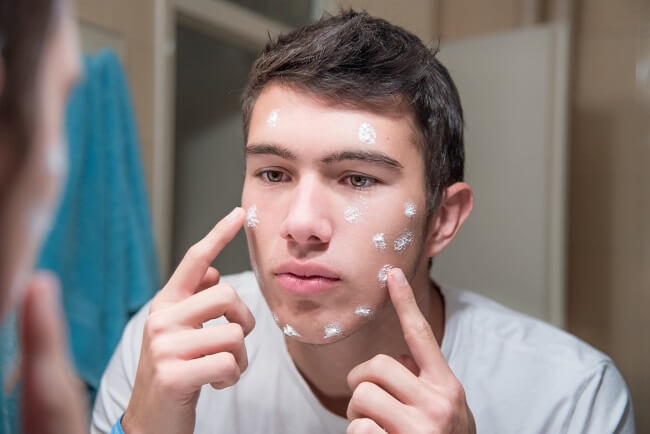1
HOME > Beauty >
ACNE: KEEPING YOUR SKIN HEALTHY
Written by Menswear Style in Beauty on the 28th April 2021

The skin is the largest organ your body has, acting as the first line of defense between us and harmful foreign invaders from outside. The skin is incredibly resilient, healing small cuts and bruises with ease, and for the most part only requires a healthy diet to do its job sufficiently. With that said, as we grow older and our hormones fluctuate throughout our lives, our skin reacts to this. For example, bodily changes might result in acne or eczema outbreaks, commonly (although not exclusively) occurring during childhood and adolescence. It pays to know how to spot when your skin needs some love and be aware of effective methods to prevent or treat skin conditions.
What is Acne?
The most common of all skin conditions, acne typically occurs during adolescence, although adult acne is also possible. It usually appears on the skin as numerous red spots, or white/blackheads, on the face, chest or back. Differing in severity from one person to the next, acne usually goes away in time with appropriate treatment, however some people may be left with permanent scarring. The reason for acne occurring is the trapping of dirt or oil in the follicle of the hair, blocking the pore and causing a spot. The fluctuation of hormones has a lot to do with acne causes, which is why acne affects young people going through puberty more so than any other age demographic.

Treating Acne
To reduce the chances of acne causing lasting scars to the face and back, it’s worth being aware of what you can do to not aggravate acne symptoms further.
- Prescription medication - for severe acne, treatments like Epiduo Gel contain antiseptics that are clinically proven to reduce acne flare ups and start clearing the skin with use as quickly as 1-week in.
- Over-the-counter medication - without the need for a prescription from a doctor or pharmacist, there are plenty of topical treatments for acne that can be bought over the counter. These gels, oils and creams are great for soothing and cooling off mild to moderate outbreaks, and have even been known to clear acne completely. These various ointments have anti-inflammatory properties and are soft and sensitive on the skin so are appropriate for regular use without concern.
- Don’t scrub - when washing your face or affected areas, be gentle with the skin, as tough exfoliation can increase your symptoms and prolong recovery times. Use a sensitive, non-perfumed soap and don’t over wash your face - twice a day is the limit to avoid overdoing it.
- Sleep tight - poor quality sleep has a strong correlation with acne outbreaks, one of the reasons being that bad sleep increases your stress levels which is a common acne trigger. Try to get to sleep at a regular time, get between 7 and 9 hours of sleep, and reduce blue light exposure before bed to help your body enter deep sleep quicker and for longer.
- Control your diet - eating slow burn carbs is the best way to get the required energy you need without prompting a spike and drop in insulin levels, something that refined sugars in unhealthy food achieves. This maintained level of insulin helps to prevent sudden acne flare-ups.
Trending
2
3
4
5
6
7
8
9
10









